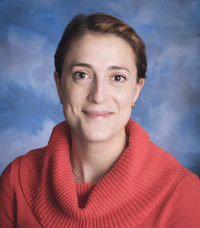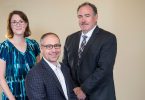Imagine how you might feel if you were seeking treatment for diabetes or asthma, and you were treated like you didn’t deserve help or your illness was your own fault. You might think twice about getting help or filling your prescription, which could have profoundly detrimental effects on your health and well-being.
You might not consider blaming someone for getting cancer or the flu, but addiction is often a different matter. Instead of being treated like they have a disease, those with substance use disorders are often treated as undeserving of help, as potential criminals, or as if they’ve made the choice to be addicts.
It is exactly this stigma, and the language used to describe substance use disorders, that the addiction treatment programs at UHS are trying to change. A new campaign to end the stigma surrounding addiction aims to guide both caregivers and the public toward using words that heal, rather than harm.

Julia Hunter, MD
Julia Hunter, MD, assistant medical director of Addiction Medicine at UHS, is among those spearheading the campaign. “We’re trying to focus very carefully on the language that we’re using because of the implication that it has,” Dr. Hunter says. “If the medical community doesn’t even use the right words, we can’t get people to understand that this is a disease.”
Dr. Hunter was moved by a study in which clinicians used very different words to describe people affected with drug or alcohol addiction, such as “abuser” rather than “user.” Those words ultimately affected how the patients were treated when they sought help, as well as how successful the patients were in treatment and recovery. “Negative language makes it more difficult for people to seek and to stay in treatment. We need to begin by calling addiction a disorder, not a choice,” says Dr. Hunter.
The campaign began with posters in and around UHS facilities that show different types of people, reinforcing that there is no one “type” of person who suffers from addiction disorders. A student, an athlete, a skateboarder, a businessperson, someone with multiple tattoos, any of these individuals may be struggling with addiction.
A chart that lists language to use or not use will be distributed to local media outlets so that they can learn the correct language and use it when reporting on addiction. Bringing caregivers and the community together to end stigma is vital in long-term treatment for substance use disorders, says Dr. Hunter.
Stop the Stigma!
The language we use to describe addiction can either hurt or heal. To best help those seeking treatment or recovery, use language that doesn’t victimize, hurt or blame.
| Instead of saying this: | Say this: |
| Addict/substance abuser/drug abuser | Person with a substance use disorder |
| Alcoholic | Person with an alcohol use disorder |
| He/she is clean | He/she is in recovery, or he/she is not currently using substances |
| He/she is dirty | He/she is currently using substances |
| Replacement/substitution (as in methadone or other treatment) | Medication-assisted treatment, medicine or medication |
HELP IS HERE
UHS offers comprehensive services for substance use disorders, focusing on the treatment and well-being of each patient. Both inpatient and outpatient options are available at multiple locations. For more information about addiction treatment and services, call 762-3232. Call 865-2115 for addiction treatment at UHS Delaware Valley Hospital.







